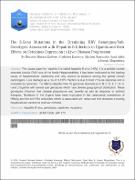The S-Gene Mutations in the Circulating HBV Genotypes/Sub-Genotypes Associated with Hepatitis B Infection in Uganda and their Effects on Cytokines Expression in Liver Disease Progression

View/
Date
2016Author
Kafeero, Hussein Mukasa
Kawooya, Abubaker
Namusoke, Mariam
Atiku, Saad
Mugambwa, Joseph
Metadata
Show full item recordAbstract
The causal agent for hepatitis B is called hepatitis B virus (HBV). It is a partially double
stranded circular DNA virus of the family Hepadnaviridae. It has been implicated as the leading
cause of hepatocellular carcinoma and only second to tobacco among the global human
carcinogens. Liver damage as a result of HBV infection is due to host immune response and is
modulate by cytokines. The HBV is classified into 10 genotype denoted as A, B, C, D, E, F, G, H,
I and J together with several sub-genotypes which have diverse geographical distribution. These
genotypes influence liver disease progression and severity as well as response to antiviral
therapies. Mutations in the S-gene have been implicated in the paradoxical coexistence of
HBsAg and the anti-HBs antibodies which is associated with advanced liver diseases including
hepatocellular carcinoma and liver cirrhosis.
Collections
- Research Papers [57]
